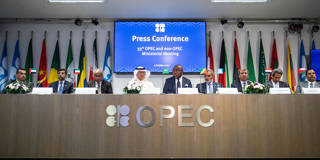In the short term, Western countries seeking to counter the Kingdom's swing-producer power could release additional strategic reserves and increase shale oil production. In the medium term, however, the West is left with little choice but to accelerate the shift away from fossil fuels.
CAMBRIDGE – The OPEC+ oil producers, led by Saudi Arabia and Russia, surprised markets earlier this month by deciding to cut production by two million barrels per day – roughly the equivalent of 2% of the global supply. The decision, which briefly sent Brent crude climbing toward $100 per barrel, signaled the cartel’s resolve to boost prices in the face of a faltering global recovery. That put US President Joe Biden in a precarious position ahead of next month’s midterm elections. But it also demonstrated Saudi Arabia’s growing willingness to resume its swing-producer role and highlighted its newfound alignment with Russia.

CAMBRIDGE – The OPEC+ oil producers, led by Saudi Arabia and Russia, surprised markets earlier this month by deciding to cut production by two million barrels per day – roughly the equivalent of 2% of the global supply. The decision, which briefly sent Brent crude climbing toward $100 per barrel, signaled the cartel’s resolve to boost prices in the face of a faltering global recovery. That put US President Joe Biden in a precarious position ahead of next month’s midterm elections. But it also demonstrated Saudi Arabia’s growing willingness to resume its swing-producer role and highlighted its newfound alignment with Russia.